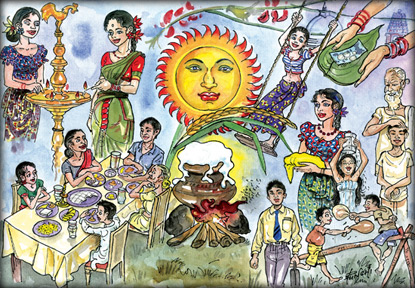New Year Festival
By Kalakeerthi Edwin Ariyadasa
“What we call the beginning is often the end. And to make an end is
to make a beginning. The end is where we start from.
T.S. Eliot (1888-1955)
 Time imposes agendas on humans. Men and women cannot escape those
imperatives. They are born. They grow up. They die. Birth, growth,
ageing and death are all determined by time. Man has but scant control -
if at all - over his destinies. Time imposes agendas on humans. Men and women cannot escape those
imperatives. They are born. They grow up. They die. Birth, growth,
ageing and death are all determined by time. Man has but scant control -
if at all - over his destinies.
Then again, our planetary home - ‘Earth’ - too is a plaything of
time. At the dictates of time, seasons alter. Autumn follows summer. On
the heels of the fall, winter makes its bleak entry. After its cold and
clammy hold on a good part of the earth, the welcome spring appears,
ridding the world of the wintry gloom.
The planet earth and its human dwellers are both time-driven. The
changing patterns of the natural world he inhabited, roused but a
vestigial curiosity in the proto - humans, who had just emerged into
biped existence, after evolving from their animal state.
Ever-alert time, continued to intervene in the evolution of this
humanoid. As time-dominated ages kept on passing, the proto-human began
to evince an increasing interest in the eco-pageant that time enacted in
the world around him. For the primitive human, life was not a mere
routine any more, as the ages passed. Unlike other animals, the humanoid
began to develop a form of attachment to the world he lived in. Spring
bred a joy in him. Summer, replete with a life-sustaining feast of
nourishing pabulum, made him yearn for what the world so lavishly
offered. The food induced sensation of physical happiness made him look
on the world with a deep pleasure.
Allure
As the fall began to rob his habitat of its allure and fecundity,
misgivings stirred within the early man. The life-thwarting grip of
insensitive winter deprived those primitive humans from being
satisfactorily fed. He was devastated. Rendered helpless he could not
help but be utterly bewildered.
This annual cycle of joy, sorrow and the renewed joy, made primitive
lives pattern - oriented. But still, propelled by primordial instincts,
he was not able to see a rational meaning in this whole natural system.
Emerged the wise-man Homo sapiens . He came up with an explanation.
There is someone much bigger in built than us. It is he who gives the
bounty to keep us sustained and joyous. But, alas, at winter, this big
being dies - leaving us devoid of protection, food and pleasure.
Weeping and lamentation were the outcome of this discovery.
But, the wiseman detected yet another phase. When we are smitten with
sorrow, the big being rises again and in stages he brings us sustenance.
Origin
This is the origin of the New Year celebrations the most ancient
festival of humans. It was spontaneous and was fully attuned to the
cycle of nature.
Passing ages elaborated this simple, reality-inspired natural rite.
A complex of associated rituals introduced by the sages and seers,
imparted to the new year festival, a whole sophisticated structure.
We in Sri Lanka have added lavishly to this festival, during
recurring ages, culling a variety of auspicious elements from a variety
of cultural sources.
Even early in the twentieth century, the Sri Lankan (Sinhala) New
Year was an intricate religio-ethnic celebration.
The austerities and joys sanctioned by traditions that date back to
the far past were sempulously adhered to by the folk of this island,
even during as recent times as the 1980s.
The old year and the New year were clearly demarcated. The neutral
hour ( nonagate’ ) was solemnly kept in view, performing the acts of
merits, that would endure the reawakening of the god of the New year.
Reunion
Relatives from distant locations would foregather at the central
family premises for the sacred reunion.
Rekindling of the heart, initial partaking of the ritual meal and the
mandatory transactions were all scrupulously observed.
But, today, those racial memories of the New Year and the extensive
folk-participation of the rites and rituals at the allotted auspicious
hours are only a shadowy presence of what they were then.
The urge and the fervour are fully gone. The months of joyous
anticipation of the arrival of the New year are now lost in a plethora
of other priorities. The village festival is now revived somewhat
mechanically by enterprising commercial interests.
This year, even a couple of days before the New year, the urban
people did not seem to be aware of the collective national festival that
was in the offing.
But, strangely enough, even in the heart of the city one could
soothen the minds, with the seasonal warbling of the untiring cuckoo
that keeps up its appealing song.
But, who stole this wholesome national ritual of real New Year? It is
largely the mismanaged modernity that has alienated our younger
generation from the fertile fountains of glorious indigenous culture.
Let us give this new millennials an opportunity to enter into that
cosy intimacy and warmth of the age-old rituals, which are totally
contrary to the surface thrills of bottled and canned fizzy culture. |

